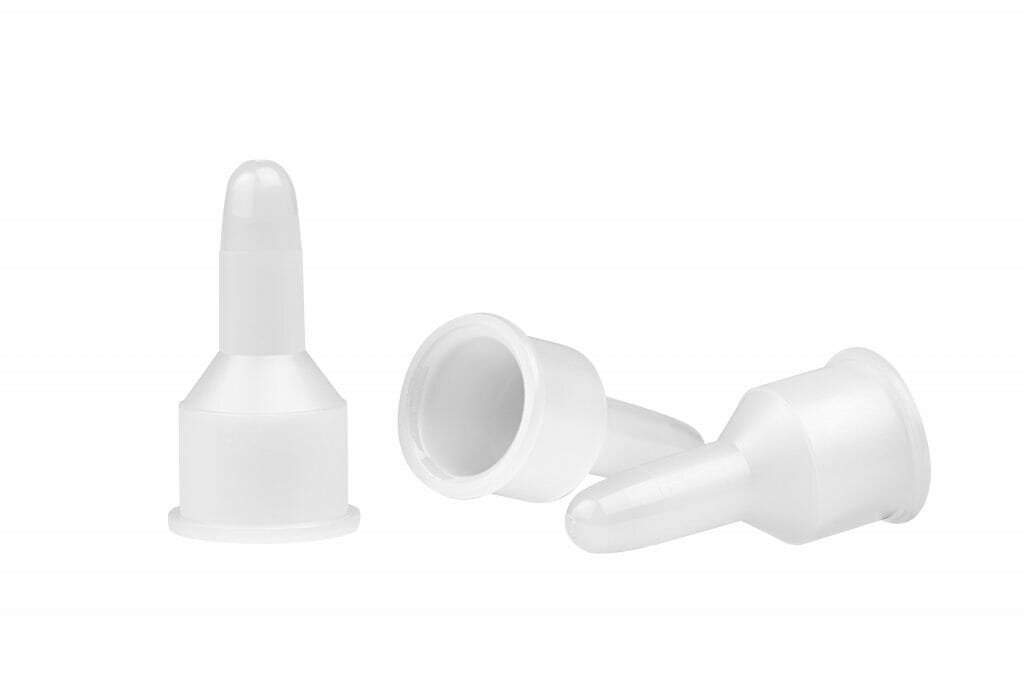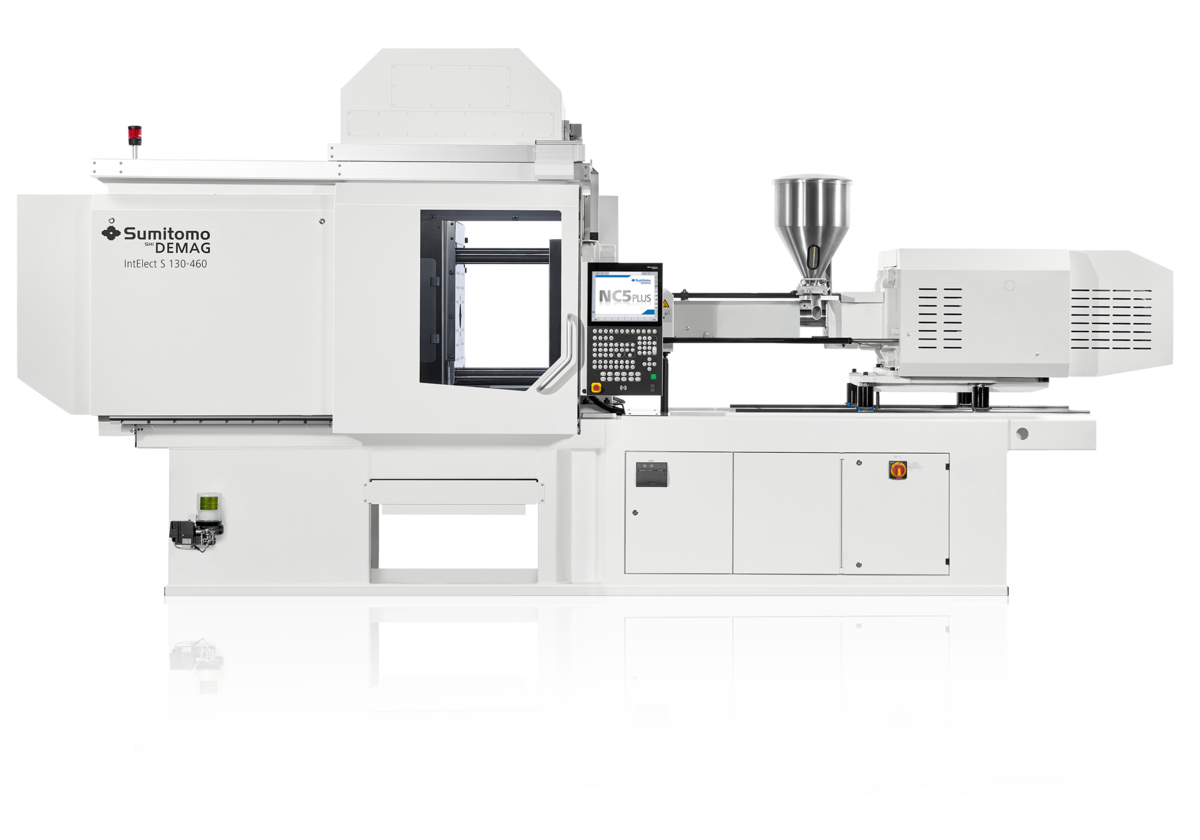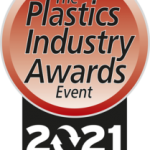Machine, automation, tools, controllers, raw materials – an entire optimised production solution customised to medical technology applications featuring comprehensive networking and digital quality control.
Schwaig, September 2021 – Sumitomo (SHI) Demag Plastics Machinery GmbH is presenting a fully automated and highly efficient production cell for medical technical parts at Fakuma 2021. In the spotlight is the all-electric IntElect S 100/460-250 injection moulding machine, featuring an automation system from Waldorf Technik GmbH, Engen, and based on their patented Vario Tip FSS system. This trade fair exhibit was designed specifically to produce medical insulin syringe caps on a 16-cavity mould in a six second cycle time.
FSS stands for Floor Space Saving and encapsulates the significantly reduced space delivered in this Vario-Tip construction compared to a standard model. Nevertheless, its high functionality and variability remain. The system is characterised by its unsurpassed freedom to accommodate various tool configurations and packaging units. Additionally, it includes a variety of unique customer-specific features that can be applied.
Immediately after removing the caps from the injection moulding machine, the removal gripper transfers them in order. The caps are sequenced according to the cavity numbers into a sliding table and from there placed into racks, maintaining the sorting of each individual cavity. Anatol Sattel, Director Business Development Medical describes the process: “After filling, the parts are checked for possible damage using a Kitov camera. At the point of ejecting all 16 parts, the system features a Quality Assurance (QA) station. A Sawyer cobot then waits at the outlet of the system and removes the filled racks from the system.”
The automation system is completed with the integration of the Smart Services EVE Suite from Hahn Digital, a subsidiary of the Hahn Group, Rheinböllen. This innovative solution supports customers with their digital transformation and smart manufacturing strategies. One component, EVE Analytics allows for the monitoring of plants across multiple locations in real time. Creating individual dashboards, independent process and machine data is captured, with further analysis options available.
By using EVE Analytics, downtime can be massively reduced. Targeted real-time notifications and location-independent status updates enable faster responses. “Data analysis and KPI-based dashboards guarantee efficient monitoring,” says Sattel. The system automatically performs a data analysis of correlations and deviations from the optimal settings. With the help of predictive analysis, data can be used to gain insights to maintain a continuous production output.
Digitalisation project for comprehensive quality control and traceability of components
“Particularly in the field of medical technology, comprehensive quality control and traceability of parts production are indispensable,” explains Anatol Sattel. “Our digitisation project more than meets these requirements. We are currently working on the development of an IoT dashboard that will enable data analysis and visualisation, transfer and storage of know-how, maintenance planning and prediction. In addition to guided assistance system providing clear steps, other autonomous functions will also be incorporated.”
According to Sattel, cycle- and time-dependent data can be collected via the machine interface and mapped via an App-based dashboard. Initially, these can be used for data server storage, the creation of KPI dashboards, the visualisation of live data, and to display historical data and trend analysis. Additionally, a troubleshooting guide helps with solving and evaluating process deviations.
Looking to the near future, Sumitomo (SHI) Demag plans to develop assistance Apps – a system for setting up and optimising processes, introducing a material and knowledge library, as well as integrating simulation tools for advanced settings and deeper insights into the processes. “Our vision is an intelligent machine that can independently make predictions about part quality, machine wear and failures and perform optimisations online,” says Sattel. “This enables process consistency to be increased, improvement in product quality, and maintenance to be adjusted accordingly.”

Producing medical insulin syringe caps on a 16-cavity mould in a six second cycle time
Increased capacity of energy recovery system ensures even better efficiency
The first results of the digitisation project are impressively illustrated on the all-electric IntElect S 100t machine at the Fakuma booth (B1-1105). At the same time, this showcase demonstrates Sumitomo (SHI) Demag’s competence in mass-producing medical applications with extremely tight tolerances. The high-precision direct drive technology ensures more precision and repeatability, resulting in higher quality medical components. The system is particularly clean, cool, fast and quiet.
Energy efficiency and total cost of ownership (TCO) are also significantly improved by the high-performance drives, confirmed by comprehensive lifetime tests on the machines and components. Spindles tested under the harshest conditions showed no signs of visible wear even after millions of cycles. “Increasing the capacity of our energy recovery system has not only improved efficiency, but also increased the longevity of the IntElect’s electrical components,” explains Sattel. Additionally, improved temperature control of the spindles, motors and inverters helps to ensure safe operation of the machine, even in the most demanding applications.
“Due to the more constant operating temperature, energy consumption is lowered with less heat needing to be dissipated from air-conditioned environments,” the expert reports. “Longevity and energy efficiency are decisive factors towards achieving our Act! Sustainably ambitions. Sumitomo (SHI) Demag is committed to developing future sustainable innovations by manufacturing machines that contribute to this. Ecological and environmentally conscious awareness is part of this corporate social responsibility blueprint,” states Sattel.
Additionally, the Medical Business Development Director highlights another important aspect. In order to comply with the explicit quality management and validation ISO 13485 standards for medical devices, new machine user parameters have been introduced. Processes are kept within certain bandwidths and operators cannot, without permission, make any adjustments to pressure, temperature, flow and cooling rates. “Adhering to the validated injection moulding processes for medical applications,” adds Sattel
Multiple needle closure system for maximum part output in minimal space
Kebo AG, Neuhausen am Rheinfall, supplies the 16-cavity mould for the production of insulin caps at the Fakuma exhibit. With the trend in medical technology targeting ever-smaller part geometries and weights, comprising critical tolerances and high complexity, the Swiss family-owned company unveils a new Multivalve system. Meeting increased demand for needle-valve systems, it offers first-class sprue quality, high production volumes – due to the proven Kebo cluster design (pitch circle diameter 60 mm – and a compact tool size to fit within the smallest possible injection moulding machines. It also impresses with its long service life and high ease of maintenance.
In this Multivalve system, the development team succeeded in maintaining the space requirements of the existing open, compact, needle closure cluster arrangement. The tiny cavity spacing delivers maximum part output for a tool surface of this size. The exhibition will show the highest expansion stage with eight cavities per cluster. Four or six cavities are also feasible, depending on the part geometry and the injection position. Uniquely, the system can also easily and safely place individual cavities.
Since the medical market typically demands all-electric solutions, especially in cleanrooms, Kebo actuates the needle closure nozzles via an electric plate. As well as the high precision, cleanliness and process reliability, the solution delivers compelling high repeatability, lower wear and very good temperature control. Additionally, the needle speed is individually adjustable. As an alternative to the electric needle closure, a pneumatic actuation of the drive is available.
Cleanroom control regulated for predestined medical technology applications
Controlling the hot runner needle closures in the mould, Kebo deploys the M-Ax control unit engineered by Mold-Masters, Baden-Baden. This unit opens and closes the hot runner needles at defined speeds and movement profiles, monitoring the end position. Its Tempmaster series controller is very flexible, can be set up for any application and doesn’t require programming knowledge. Controlling all linear (e.g., core pulls, ejectors) and rotary axes (e.g., index plates, rotary plates), the all-electric M-Ax unit is ideally suited to cleanroom environments and therefore regulated medical applications.
M-Ax offers maximum accuracy and the simplest automated tool customisation options. The servo-axis control functionality can be combined with up to 256 temperature-control zones. Up to 64 inputs and outputs are feasible, offering complete control of all injection moulding functions. Additionally, the controller is very efficient, consuming up to 60 percent less energy. This is due to the servo drives, which only require electricity on movement. One device can be used for several tools, increasing its flexibility. In addition to the compact design, the touchscreen featuring large symbols delivers easy operation and user-friendly, intuitive servo and temperature control.
Easy-flow, performance-optimised, medical-safe PP copolymer
Plastic granules used at the booth are especially suitable for medical applications, characterised by a melt flow rate of 70 g/10 min to facilitate complete filling of the 16-cavity mould. Supplied by Borealis AG, Vienna, Sumitomo (SHI) Demag previously cooperated with this partner to successfully tested pipette tips using the trademarked Bormed material, highlights Sattel.
A high flow hetero-phasic PP copolymer specifically developed by Borealis supports healthcare customers comply with EU medical device (MDR) and in vitro diagnostic (IVDR) regulations, thereby increasing patient safety. Offering a better flow and high impact strength, from a machine performance perspective, the high flow ability of the material optimises the production cycle time.
Sattel concludes: “Since our last major exhibit, the medical sector has faced some significant pandemic challenges, in addition to the introduction of new EU medical device regulations. Despite this, our industry-focused sales structure has enabled us to respond swiftly and apply our industry competence and expertise in a much more targeted and efficient manner for the benefit of our medical customers. Additionally, our collaboration program with our major industry partners continues to support transformative projects, maintaining SDG’s preferred partner position and conveying our longstanding message that we are the “easiest to work with.”





